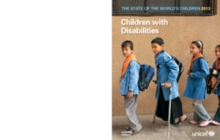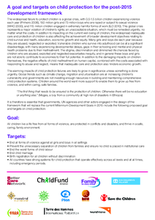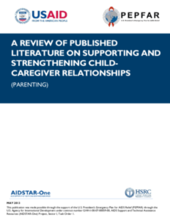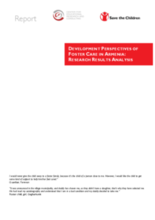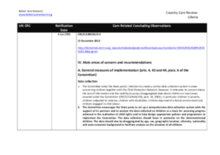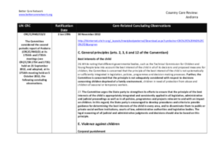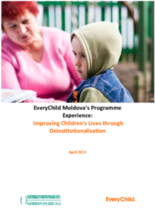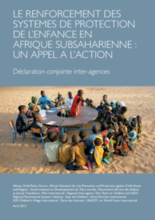Displaying 731 - 740 of 947
In its 2013 State of the World’s Children Report, UNICEF has chosen to highlight the particular issues, needs, and circumstances of children with disabilities worldwide. The report includes a description of the common issues that children with disabilities face, models for inclusive policy and practice, and an agenda for action moving forward.
This statement from a group of international and national agencies working towards children's protection include recommendations for the inclusion of a major goal and specific targets on children's care and protection as part of the framework that will replace the current Millennium Development Goals in 2015.
This paper presents a comprehensive literature review of evidence-based parenting programs from around the world. The report reviews published literature from 2000 to 2012 and summarizes empirically based recommendations for supporting and strengthening child-caregiver relationships in the context of AIDS and poverty.
This report produced by the Center for Educational Research and Save the Children summarises a broader research study which examined the foster care pilot programme introduced in Armenia in 2005. The study aimed to find out if the pilot program succeeded, what problems arose, how the program could be improved and how foster care in Armenia could develop and expand effectively.
This 5-minute animated video depicts a theory of change for achieving breakthrough outcomes for vulnerable children and families. It describes the need to focus on building the capabilities of caregivers and strengthening the communities that together form the environment of relationships essential to children’s lifelong learning, health, and behavior.
This country care review includes the Concluding Observations for the Committee on the Rights of the Child adopted as part of its examination of Liberia's second and fourth periodic reports at the 61st Session of the Committee held between 17 September and 5 October, 2012. The Committee’s recommendations on the issue of Family Environment and Alternative Care as well as other care relevant issues are highlighted.
This country care review includes the Concluding Observations for the Committee on the Rights of the Child adopted as part of its examination of Andorra's second periodic report at the 61st Session of the Committee held between 17 September and 5 October, 2012, as well as other care-related concluding observations, ratification dates, and links to the Universal Periodic Review and Hague Intercountry Adoption Country Profile.
This Program Review documents the evolution of EveryChild/Partnerships for Every Child’s Program in Moldova since 1994, presenting the development of interventions to improve the lives of children through deinstitutionalization and identifying the best practices and lessons that may be relevant, useful, and replicable to other initiatives and organizations around the world.
Cette déclaration conjointe inter-agences a pour but de (i) de présenter une vision commune des systèmes de protection de l’enfance en Afrique subsaharienne et d’expliquer pourquoi ils sont importants et méritent des investissements et (ii) lancer un appel à l’action auprès des gouvernements, à l’Union africaine, aux communautés économiques régionales, aux institutions multilatérales, aux bailleurs de fonds, au secteur privé, aux institutions académiques, aux organisations de la société civile, aux communautés et aux groupes d’enfants et de jeunes organisés.
This report, published by the National Society for the Prevention of Cruelty to Children (NSPCC) in the UK, highlights the need to improve outcomes for children leaving care and returning to parents or families. The NSPCC provides recommendations for policymakers and practitioners to improve the quality of assessment, planning, and preparation regarding when and if a child should be returned home from care and to increase the support for children and their families once they return to their families.

